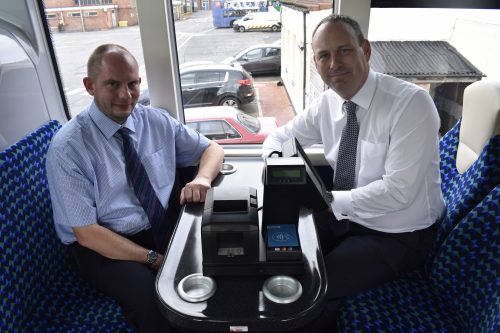
Dominic Ward speaks to Punctuality and Reliability Manager, Matt Parker, and Commercial Manager, Simon Ford, about smart-ticketing and fare structures for First West of England
In a small office at Bristol’s Lawrence Hill depot, some of the biggest decisions the business will make are carried out – ticketing. Getting the fare structure and system right is crucial to the successful running of any bus operation. Matt Parker, Punctuality & Reliability Manager, and Simon Ford, Commercial Manager, sat down with me to talk through their ticketing strategy.
Joining the industry in 1988, Matt began as a driver at Birmingham-based Travel West Midlands, now known as National Express West Midlands, and over the next 15 years, progressed to the level of Depot Manager at Perry Barr garage. Moving to Bristol in 2002, Matt took on some of the IT-based work, including the implementation of real-time systems and company WiFi, whilst looking at how to use IT to improve punctuality. He has latterly taken on the ticketing aspect.
Beginning as a driver, Simon worked at the now closed Muller Road depot in Bristol, and holds a degree in Geography from the University of the West of England. Whilst at University, in addition to driving buses part-time, Simon completed his dissertation on the subject of university bus services. Applying for First’s graduate scheme with 24 hours to spare, Simon has completed placements in the South Wales, Scotland, York, Manchester and London, before moving back to Bristol in 2009, and has held a number of roles previous to becoming Commercial Manager in Bristol.
Shortly before CBW arrived in Bristol, the fleet had just received brand new Ticketer systems, which has been installed the previous Sunday – November 5.
Ticketer
Although only recently installed at the time of visiting Lawrence Hill, Matt was enthusiastic about the new technology: “We’re finding it a very good product and we’re enjoying its flexibility. Its functionality is far better than the products that we previously had, including the ability to produce and scan barcodes, as well as the forthcoming rollout of contactless payments. The extra benefits it can bring to the business are huge.”
The team in Bristol already had a taste of the Ticketer system, with it being used on the Park & Ride, and was one of three selected trial sites.[…]
By subscribing you will benefit from:
- Operator & Supplier Profiles
- Face-to-Face Interviews
- Lastest News
- Test Drives and Reviews
- Legal Updates
- Route Focus
- Industry Insider Opinions
- Passenger Perspective
- Vehicle Launches
- and much more!


